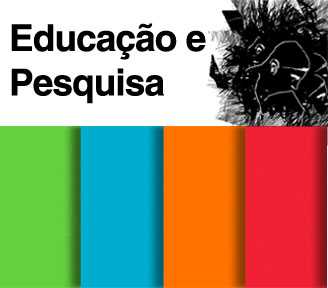Meanings of education in distance learning advertising: from the process paradigm to the product paradigm
DOI:
https://doi.org/10.1590/S1678-4634202248243770porAbstract
In this article, based on the theoretical-methodological framework of Discourse Analysis, we analyze advertising pieces that put distance learning (DL) on sale in the market. Such advertisements circulate socially – although not exclusively – in the online form. Our objective was to restore, by means of a discursive and materialist interpretative device, (re)interpretation conditions to the process of producing effects of meanings evocable in and through the referred advertising pieces. This restoration was carried out by focusing on how the meanings of education at stake in DL advertising shift the inscription of (distance) learning, moving it away from the process paradigm and leading it toward the product paradigm. This rendering process produces, as an effect, the projection of (distance) learning to the status of merchandise. By means of our analyses, we show that, as merchandise, DL advertising establishes discourses that aggravate the class struggle in neoliberal capitalist society by means of articulation and discursive transversality that (re)direct DL’s discursive reduction to professionalization, to effortlessness, to instantaneousness, to the digital form and to jobs, configuring DL as the “new normal” of/in education. Because of this discursive practice and its impact on society, the discursive devices operating in DL advertising produce a risk to the emancipation of the subject in and through (distance) learning.
Downloads
References
AGUSTINI, Cármen L. H.; ARAÚJO, Érica Daniela de. A figura do feminino em filmes infantis: pregnância e circulação de sentidos. Horizonte Científico, Uberlândia, v. 3, n. 1, p. 1-27, 2009. Disponível em: http://www.seer.ufu.br/index.php/horizontecientifico/article/view/4259 Acesso em: 2 jul. 2020.
» http://www.seer.ufu.br/index.php/horizontecientifico/article/view/4259
ALTBACH, Philip G. Knowledge and education as international commodities: the collapse of the common good. International Higher Education, Washington, DC, n. 28, p. 55-60, 2002. Disponível em: https://ejournals.bc.edu/index.php/ihe/article/view/6657/5878 Acesso em: 2 jul. 2020.
» https://ejournals.bc.edu/index.php/ihe/article/view/6657/5878
AVELAR, Marina. A caixa preta das startups da educação. [Entrevista cedida a] Cátia Guimarães. Outras Mídias, São Paulo, 10 jul. 2020. Disponível em: https://outraspalavras.net/outrasmidias/a-caixa-preta-das-startups-da-educacao/ Acesso em: 2 jul. 2020.
» https://outraspalavras.net/outrasmidias/a-caixa-preta-das-startups-da-educacao/
CARVALHO, Cristina Helena Almeida de. A mercantilização da educação superior brasileira e as estratégias de mercado das instituições lucrativas. Revista Brasileira de Educação, Rio de Janeiro, v. 18, n. 54, p. 761-801, 2013. Disponível em https://www.scielo.br/pdf/rbedu/v18n54/13.pdf Acesso em: 2 jul. 2020.
» https://www.scielo.br/pdf/rbedu/v18n54/13.pdf
DIAS, Cristiane. Análise do discurso digital: sujeito, espaço, memória e arquivo. Campinas: Pontes, 2018.
DIAS, Cristiane. Imagens e metáforas do mundo. Rua, Campinas, v. 15, n. 2, p. 15-28, 2009. Disponível em: https://periodicos.sbu.unicamp.br/ojs/index.php/rua/article/view/8638853/6459 Acesso em: 2 jul. 2020.
» https://periodicos.sbu.unicamp.br/ojs/index.php/rua/article/view/8638853/6459
LAVAL, Christian. A escola não é uma empresa: o neoliberalismo em ataque ao ensino público. 2. ed. São Paulo: Boitempo, 2019.
OLIVEIRA, Romualdo Pereira de. A transformação da educação em mercadoria no Brasil. Educação & Sociedade, Campinas, v. 30, n. 108, p. 739-760, 2009. Disponível em: <https://www.scielo.br/pdf/es/v30n108/a0630108.pdf> Acesso em: 2 jul. 2020.
» https://www.scielo.br/pdf/es/v30n108/a0630108.pdf>
ORLANDI, Eni Puccinelli. Formação ou capacitação? Duas formas de ligar sociedade e conhecimento. In: FERREIRA, Eliana Lucia; ORLANDI, Eni Puccinelli (org.). Discursos sobre a inclusão. Niterói: Intertexto, 2014. p. 141-186.
PÊCHEUX, Michel. Papel da memória. In: ACHARD, Pierre et al. (org.). Papel da memória. Campinas: Pontes, 1999. p. 49-57.
PÊCHEUX, Michel. Semântica e discurso: uma crítica à afirmação do óbvio. Campinas: Unicamp, 1995.
PÊCHEUX, Michel; GADET, Françoise. A língua inatingível. In: ORLANDI, Eni Puccinelli. Análise do discurso: Michel Pêcheux. Campinas: Pontes, 2011. p. 93-106.
RODRIGUES, Eduardo Alves. “A costura do invisível”: sentido e sujeito na moda. In: CARROZZA, Guilherme; SANTOS, Mirian dos; SILVA, Telma Domingues da (org.). Sujeito, sociedade, sentidos. Campinas: RG, 2012. p. 117-134.
SGUISSARDI, Valdemar. Modelo de expansão da educação superior no Brasil: predomínio privado/mercantil e desafios para a regulação e a formação universitária. Educação & Sociedade, Campinas, v. 29, n. 105, p. 991-1022, 2008. Disponível em: https://www.scielo.br/pdf/es/v29n105/v29n105a04.pdf Acesso em: 2 jul. 2020.
» https://www.scielo.br/pdf/es/v29n105/v29n105a04.pdf
SILVA JÚNIOR, João dos Reis; SGUISSARDI, Valdemar. A educação superior privada no Brasil: novos traços de identidade. In: SGUISSARDI, Valdemar (org.). Educação superior: velhos e novos desafios. São Paulo: Xamã, 2000. p. 155-177.
Downloads
Published
Issue
Section
License
Copyright (c) 2022 Educação e Pesquisa

This work is licensed under a Creative Commons Attribution-NonCommercial 4.0 International License.
Authors assume exclusive responsibility for the concepts expressed in their articles, which do not necessarily reflect the journal’s opinion.
Permission to photocopy all or part of the material published in the journal is granted provided that the original source of publication be assigned.



